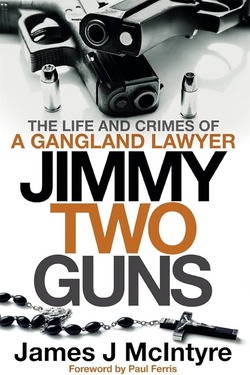Jimmy McIntyre was a criminal lawyer in Scotland sentenced to three years in prison in 1997. Jimmy Two Guns: The Life and Crimes of a Gangland Lawyer (2023) is his personal account of his life, from early student antics through becoming a defense lawyer and consigliere to Glasgow’s crime bosses until his arrest in 1996 for possession of two guns, hence the nickname. Holding no firearms license and claiming a client asked him to hand them in as part of an amnesty, what we have is an attempt to put on record his own account outside the material facts of the case.
Billed as his ‘astonishing true story’, it leads us to wonder what truth is in a post-truth world for this is just one man’s version of the truth. McIntyre sees his career’s ignominious end as nothing more than a stitch-up by the police, a Crown conspiracy that sought to bring him down for his success at getting criminals off the hook. There’s many a chapter where verbal dexterity or gaming the system can – and does – lead to a case’s collapse, all told with an obvious relish. It’s clear to see why a system that seeks successful prosecutions would want someone like McIntyre out of the way. Maybe it was true, but there’s a whiff of paranoia without evidence.
It’s a book that seems to want to convince the reader, not of McIntyre’s innocence, but of the severity of his treatment. It’s not Humbert Humbert levels of persuasion, but McIntyre clearly considers hypocrisy to be a running theme. Why did they come for me? Look at what other solicitors were doing. It’s one rule for me and another for them. Surely that crime deserves more than what I got? It’s a fair accusation as we know all too well that institutions are inclined to protect their own – people and reputation – and in the stories related there are heinous crimes that seem to go punished only with, er, career advancement.
The book has an almost conversational tone, as if McIntyre was telling it to you direct, and his language is sprinkled with Scottish patter and occasionally a humorously hard-boiled turn of phrase. But there’s also a sense of uncertainty in who the audience is (“dear reader”; “the reader”; “should this book have attracted any reader from south of the border”). Some obvious things get explained while more esoteric mentions pass with little comment. Although McIntyre could just as well be called Jimmy Two Times as there’s many a frustrating repetition, such as explanations of the HORT1 traffic form or his referencing Billy Connolly on the Territorial Army.
Where the book is most interesting is in its relaying of activities within the Scottish legal and penal systems, showing how courts work, from the defence perspective, and a brief glimpse into prison life. What we don’t see so much of is the gangland stuff. Sure, there are cases here and there, and an attempted hit for good measure, but no doubt a certain omerta keeps the juicier stories from reaching the page and one thing McIntyre is at pains to make clear is that he’s not a snitch. Another Glasgow gangster, turned writer, refers in his foreward to McIntyre’s office being known as ‘the Confessional’ and that McIntyre wouldn’t loose his lips to flip a friend.
After detailing McIntyre’s career in criminal defence – more so the successes than the failures – the question of his own conviction around the two guns comes back into question. He pushes their location (“in a locked drawer, in a locked garage”) over the fact of possession. As we hear so often in the book, the truth is irrelevant in a court of law and it’s ultimately down to the most convincing argument. In Scots Law, the establishment of facts requires corroboration and, this book being one man’s experience, McIntyre has little choice but to leave it “to the reader to decide if my sentence was fair”. No doubt each reader will draw their own conclusions, such is the truth.
